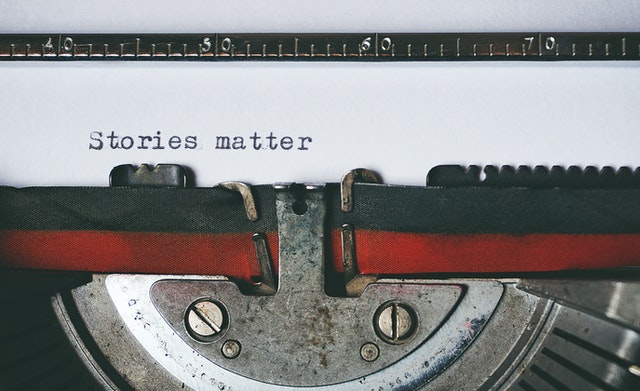
"Two or three things I know for sure, and one of them is that to go on living I have to tell stories, that stories are the one sure way I know to touch the heart and change the world." — Dorothy Allison, American writer, speaker and member of the Fellowship of Southern Writers
Let me tell you an important lesson: Don't let projects go until the last minute, because the quality of your work will suffer, and you might have to deal with unintended consequences.
That's an important life lesson. But if I just told you that and walked away, you would probably forget it fairly quickly. It's bland. It unemotional. It doesn't connect with you. It's just a statement.
Now, let me tell you a story
I took a course my senior year of high school where you had a fictional child and learned all about how to take care of it (yes, just like a sitcom high school student). We never carried around eggs to take care of, but the final project for the year was to put together a plan to care for the baby.
This involved developing a budget for supplies, food, and whatever else the baby needed. The details escape me now, 17 years later, but it was very involved, and the final project was submitted in the form of a very detailed packet demonstrating that you shopped for the child with real-world pricing and had all of its needs covered.
It was a fairly straightforward assignment, and even though Google wasn't really a thing back then, I figured I could sit down with a newspaper and hash out most of it. There wasn't a lot of studying involved, so my efforts were more focused on history and math in the weeks leading up to the due date.
Suddenly, I found myself staring down the night before the due date. Oh, and I had a choir practice right after school. Then I had to work at my job until 11 p.m. I was a little nervous – but how hard could it be?
I got home from this job, sat down at the kitchen table with dinner, and started this project that was due in the morning.
The hours ticked by while I scrambled in the silent house, my entire family asleep, and me at the kitchen table working my way through newspaper clippings and scribblings in my notebook. I poured myself a cup of instant coffee, even though I didn't drink coffee at the time and also couldn't work the coffee pot. It was disgusting, but I thought that's what you did when you had to pull an all-nighter.
I finished the job and crawled into bed at about 5.30 a.m., just as my mother was waking up. She told my ride to school not to pick me up so I could squeeze another half hour out of sleep. She would take me to school herself. I dragged myself out of bed at 6.45 a.m. and got ready for the day.
Oh, and I got a "C" on the project, which was basically my grade for the semester.

There's a reason we tell stories
Besides being more entertaining, stories are memorable.
I tell you a truth, it makes sense intellectually. I show you a truth through a story, you connect emotionally.
You can put yourself in my shoes, right? We've all pulled an all-nighter of some kind in our lives. And that's the hook that pulls you in.
When you connect emotionally, you create a feeling that drives action. So if you want someone to understand a truth about life, there's no better way to do it than by telling a relatable story.
That's why even the oldest tribes in history passed down lessons through story. Jesus Christ spoke in parables. Buddha told stories. When you want to get a message across and into someone's heart, you touch them with a story.
How to tell a story
First, understand that it doesn't matter what medium you use. You can tell a story in a song, a book, a poem, a short story, an email, a text, a tweet.
Know the purpose of the story that you are trying to tell. Are you trying to convey a truth? Teach a useful lesson? Persuade someone to take action? Whatever it is, keep that at the forefront of the story you're telling. Notice how I didn't go into what happened at work in my story above? Even if it was something entertaining, it wouldn't have mattered to the core purpose of the story. Make every word matter.
Also, understand what your audience will connect with. Make it appropriate for who is reading and the lesson itself. I could tell you a story about me golfing in the mountains of Taiwan. It's a true story, but is it relatable? Probably not for the majority of you. Staying up late because I put something off to the last minute? Far more relatable.
How personal can you make it? Notice the little detail I slipped in there about making instant coffee. Not only is that kinda funny, it's also the kind of detail that sets the story apart from any old story about staying up late. It makes it my story, instead of just any tale.
Next, make sure it's appropriate for the medium you are using. Where is your audience coming from when they see or hear your story? Are they scrolling through their phone? Are they diving in to really get into some reading? Is it a quick sound bite or two on an Instagram Story? Be mindful of where they are and use the medium in the right way. Because this is a longer blog post, I was able to dedicate a handful of paragraphs to it. That matters.
Finally, draw out emotion, but be realistic. If I wrote about the existential dread that rushed through my veins and pricked my skin with goosebumps as I sat down at the kitchen table, that would be a little too much emotion for this type of story. But I did mention my nerves – and the famous last words, "How hard could it be?"
Telling a great story is a balancing act between showing emotions and getting the facts across, describing details and sticking to the main idea. But the more stories you tell, the more you will learn how to get one across the right way for your audience.
And the more stories you tell, the stronger your message will be.


